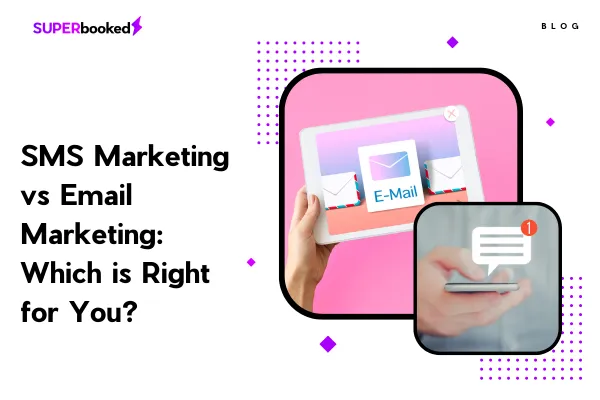Tips for success
Blog

SMS Marketing vs. Email Marketing: Which is Right for You?
In the bustling marketing world, keeping up with the best ways to reach your audience is crucial, especially for appointment-based businesses. Two compelling contenders in the marketing ring are text marketing and email marketing. Both have proven effective in reaching and engaging customers, but which one will deliver the knockout punch for your appointment-based business? In this blog post, we'll take a closer look at both contenders and determine which one triumphs as the ultimate marketing tool for businesses like yours.
Speed and Open Rates
If you're looking for a quick and effective way to communicate with your customers or leads, text marketing is the way to go! With an average response time of only 90 seconds, text messaging beats out email by a landslide, which can take up to 90 minutes for a response. And that's not all. SMS also boasts an impressive open rate of 98%, compared to just 20% for email.
This means that when you send appointment reminders, confirmations, or promotional messages via SMS, you're almost guaranteed that they'll be seen and acted upon by your audience. Whether you're running a photo studio, salon, or any other appointment-based business, text marketing is a powerful tool that can help you stay connected with your customers and keep them engaged with your brand.
Plus, with the ability to send messages directly to your customers' phones, you can be sure that your messages reach the correct people at the right time. And since most people check their text messages frequently throughout the day, you can be confident that your message will be seen almost instantly, which is crucial regarding time-sensitive promotions or urgent appointment reminders.
Attention and Personalizatiom
SMS marketing also secures an advantage in capturing customer attention. Text messages are more personal than emails since they arrive directly on a recipient's phone. This personal touch can help you build stronger relationships with your customers, leading to higher engagement rates.
But don't count email marketing out just yet! Even though it may not be as personal as a text message, you can still tailor your messages to specific groups of customers using dynamic content or segmentation. By sending targeted emails that speak directly to your audience's interests and needs, you can keep them engaged and interested in your brand.
For example, you could segment your email list while taking into account past purchase history or demographics, then create custom content that speaks directly to those groups. Or, you could use dynamic content to further personalize the email experience by inserting personalized product recommendations or promotions based on a customer's past behavior.
The key to SMS or email marketing success is to make your messages as relevant and personalized as possible. Whether you're sending a text message or an email, the goal should always be to connect with your customers and make them feel appreciated and valued. By doing so, you can build stronger relationships with your audience and drive higher engagement rates over time.
Length and Content
When it comes to length and content, email marketing has a clear advantage. With email, you have a more extensive playground to work with, allowing you to create richer content with images, videos, and links. This makes it an ideal platform for showcasing your brand and services in a more detailed and engaging manner.
However, SMS marketing has its advantages when it comes to content. While it may seem limited due to its character limit, its short and sweet approach can appeal to those who appreciate concise communication. This can be especially useful for appointment-based businesses, who can use SMS messages to send quick reminders and updates to their customers.
But in reality, both methods have their place in appointment-based businesses. Emails can be used to share important details about your services, promotions, or events, while SMS can be used for quick reminders and updates. By leveraging the strengths of both methods, you can create a comprehensive marketing strategy that meets the needs and preferences of your customers.
For example, you could use email to send a monthly newsletter highlighting new services or promotions while also including links to your social media channels or website. At the same time, you could use SMS to send appointment reminders or updates, ensuring that your customers never miss a beat. By finding the right balance between email and SMS marketing, you can create a seamless customer experience that drives engagement and loyalty over time.
Cost and Integration
Budget-wise, email marketing is the more cost-effective option, as it costs less per message than text marketing. This makes it a great choice if you want to reach a large audience without breaking the bank.
However, text marketing's impressive open and response rates may offer a better return on investment (ROI) in the long run, despite the slightly higher cost per message. With SMS, you can expect to see a higher engagement rate, which could lead to more appointments and sales over time.
Moreover, email and SMS marketing can be easily integrated with other channels and software, making managing your communications from one email and SMS marketing platform easy. This can assist you in streamlining your marketing efforts, saving time, and increasing efficiency.
For instance, you can use an email and SMS marketing platform that integrates with your appointment scheduling system, automatically sending reminders, promotions, and updates based on each customer's booking history.
Regulations and Compliance
Both SMS and email marketing require businesses to comply with laws and regulations. In the United States, the Federal Communications Commission (FCC) and the Federal Trade Commission (FTC) have regulations for both types of marketing. The FCC oversees the rules governing telemarketing and text messaging, ensuring compliance with the Telephone Consumer Protection Act (TCPA). This law specifically forbids telemarketers from making unsolicited calls or sending text messages to cell phones without obtaining explicit consent from the recipient beforehand. The TCPA also requires you to include opt-out mechanisms in their text messages. The FTC, on the other hand, regulates SMS marketing under the CAN-SPAM Act. This act regulates the content and sending of commercial text messages, requiring you to include an opt-out mechanism and their contact information in the message.
Strict adherence to these regulations not only keeps you in compliance but also prevents customers from feeling bombarded with unwanted messages. It's essential to ensure that your email marketing and SMS campaigns follow the necessary guidelines, so you can effectively reap the benefits of either method.
Final Thoughts
When comparing SMS marketing to email marketing for appointment-based businesses, determining the winner depends on your specific needs and strategies. SMS marketing excels in speed, open rates, and personalized attention, while email marketing allows for richer content and a lower cost per message. Ultimately, the best approach might be to incorporate both methods into your marketing strategy, using the strengths of each to complement and enhance the other. By striking the right balance, you can reap the rewards of both marketing methods and keep your appointment calendar full.
